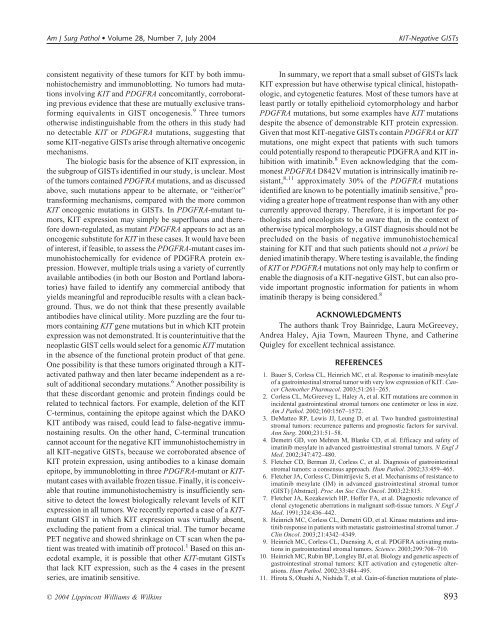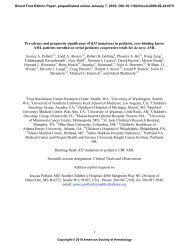KIT-negative gastrointestinal stromal tumors: proo... - ResearchGate
KIT-negative gastrointestinal stromal tumors: proo... - ResearchGate
KIT-negative gastrointestinal stromal tumors: proo... - ResearchGate
Create successful ePaper yourself
Turn your PDF publications into a flip-book with our unique Google optimized e-Paper software.
Am J Surg Pathol • Volume 28, Number 7, July 2004<br />
<strong>KIT</strong>-Negative GISTs<br />
consistent negativity of these <strong>tumors</strong> for <strong>KIT</strong> by both immunohistochemistry<br />
and immunoblotting. No <strong>tumors</strong> had mutations<br />
involving <strong>KIT</strong> and PDGFRA concomitantly, corroborating<br />
previous evidence that these are mutually exclusive transforming<br />
equivalents in GIST oncogenesis. 9 Three <strong>tumors</strong><br />
otherwise indistinguishable from the others in this study had<br />
no detectable <strong>KIT</strong> or PDGFRA mutations, suggesting that<br />
some <strong>KIT</strong>-<strong>negative</strong> GISTs arise through alternative oncogenic<br />
mechanisms.<br />
The biologic basis for the absence of <strong>KIT</strong> expression, in<br />
the subgroup of GISTs identified in our study, is unclear. Most<br />
of the <strong>tumors</strong> contained PDGFRA mutations, and as discussed<br />
above, such mutations appear to be alternate, or “either/or”<br />
transforming mechanisms, compared with the more common<br />
<strong>KIT</strong> oncogenic mutations in GISTs. In PDGFRA-mutant <strong>tumors</strong>,<br />
<strong>KIT</strong> expression may simply be superfluous and therefore<br />
down-regulated, as mutant PDGFRA appears to act as an<br />
oncogenic substitute for <strong>KIT</strong> in these cases. It would have been<br />
of interest, if feasible, to assess the PDGFRA-mutant cases immunohistochemically<br />
for evidence of PDGFRA protein expression.<br />
However, multiple trials using a variety of currently<br />
available antibodies (in both our Boston and Portland laboratories)<br />
have failed to identify any commercial antibody that<br />
yields meaningful and reproducible results with a clean background.<br />
Thus, we do not think that these presently available<br />
antibodies have clinical utility. More puzzling are the four <strong>tumors</strong><br />
containing <strong>KIT</strong> gene mutations but in which <strong>KIT</strong> protein<br />
expression was not demonstrated. It is counterintuitive that the<br />
neoplastic GIST cells would select for a genomic <strong>KIT</strong> mutation<br />
in the absence of the functional protein product of that gene.<br />
One possibility is that these <strong>tumors</strong> originated through a <strong>KIT</strong>activated<br />
pathway and then later became independent as a result<br />
of additional secondary mutations. 6 Another possibility is<br />
that these discordant genomic and protein findings could be<br />
related to technical factors. For example, deletion of the <strong>KIT</strong><br />
C-terminus, containing the epitope against which the DAKO<br />
<strong>KIT</strong> antibody was raised, could lead to false-<strong>negative</strong> immunostaining<br />
results. On the other hand, C-terminal truncation<br />
cannot account for the <strong>negative</strong> <strong>KIT</strong> immunohistochemistry in<br />
all <strong>KIT</strong>-<strong>negative</strong> GISTs, because we corroborated absence of<br />
<strong>KIT</strong> protein expression, using antibodies to a kinase domain<br />
epitope, by immunoblotting in three PDGFRA-mutant or <strong>KIT</strong>mutant<br />
cases with available frozen tissue. Finally, it is conceivable<br />
that routine immunohistochemistry is insufficiently sensitive<br />
to detect the lowest biologically relevant levels of <strong>KIT</strong><br />
expression in all <strong>tumors</strong>. We recently reported a case of a <strong>KIT</strong>mutant<br />
GIST in which <strong>KIT</strong> expression was virtually absent,<br />
excluding the patient from a clinical trial. The tumor became<br />
PET <strong>negative</strong> and showed shrinkage on CT scan when the patient<br />
was treated with imatinib off protocol. 1 Based on this anecdotal<br />
example, it is possible that other <strong>KIT</strong>-mutant GISTs<br />
that lack <strong>KIT</strong> expression, such as the 4 cases in the present<br />
series, are imatinib sensitive.<br />
In summary, we report that a small subset of GISTs lack<br />
<strong>KIT</strong> expression but have otherwise typical clinical, histopathologic,<br />
and cytogenetic features. Most of these <strong>tumors</strong> have at<br />
least partly or totally epithelioid cytomorphology and harbor<br />
PDGFRA mutations, but some examples have <strong>KIT</strong> mutations<br />
despite the absence of demonstrable <strong>KIT</strong> protein expression.<br />
Given that most <strong>KIT</strong>-<strong>negative</strong> GISTs contain PDGFRA or <strong>KIT</strong><br />
mutations, one might expect that patients with such <strong>tumors</strong><br />
could potentially respond to therapeutic PDGFRA and <strong>KIT</strong> inhibition<br />
with imatinib. 8 Even acknowledging that the commonest<br />
PDGFRA D842V mutation is intrinsically imatinib resistant,<br />
8,11 approximately 30% of the PDGFRA mutations<br />
identified are known to be potentially imatinib sensitive, 8 providing<br />
a greater hope of treatment response than with any other<br />
currently approved therapy. Therefore, it is important for pathologists<br />
and oncologists to be aware that, in the context of<br />
otherwise typical morphology, a GIST diagnosis should not be<br />
precluded on the basis of <strong>negative</strong> immunohistochemical<br />
staining for <strong>KIT</strong> and that such patients should not a priori be<br />
denied imatinib therapy. Where testing is available, the finding<br />
of <strong>KIT</strong> or PDGFRA mutations not only may help to confirm or<br />
enable the diagnosis of a <strong>KIT</strong>-<strong>negative</strong> GIST, but can also provide<br />
important prognostic information for patients in whom<br />
imatinib therapy is being considered. 8<br />
ACKNOWLEDGMENTS<br />
The authors thank Troy Bainridge, Laura McGreevey,<br />
Andrea Haley, Ajia Town, Maureen Thyne, and Catherine<br />
Quigley for excellent technical assistance.<br />
REFERENCES<br />
1. Bauer S, Corless CL, Heinrich MC, et al. Response to imatinib mesylate<br />
of a <strong>gastrointestinal</strong> <strong>stromal</strong> tumor with very low expression of <strong>KIT</strong>. Cancer<br />
Chemother Pharmacol. 2003;51:261–265.<br />
2. Corless CL, McGreevey L, Haley A, et al. <strong>KIT</strong> mutations are common in<br />
incidental <strong>gastrointestinal</strong> <strong>stromal</strong> <strong>tumors</strong> one centimeter or less in size.<br />
Am J Pathol. 2002;160:1567–1572.<br />
3. DeMatteo RP, Lewis JJ, Leung D, et al. Two hundred <strong>gastrointestinal</strong><br />
<strong>stromal</strong> <strong>tumors</strong>: recurrence patterns and prognostic factors for survival.<br />
Ann Surg. 2000;231:51–58.<br />
4. Demetri GD, von Mehren M, Blanke CD, et al. Efficacy and safety of<br />
imatinib mesylate in advanced <strong>gastrointestinal</strong> <strong>stromal</strong> <strong>tumors</strong>. N Engl J<br />
Med. 2002;347:472–480.<br />
5. Fletcher CD, Berman JJ, Corless C, et al. Diagnosis of <strong>gastrointestinal</strong><br />
<strong>stromal</strong> <strong>tumors</strong>: a consensus approach. Hum Pathol. 2002;33:459–465.<br />
6. Fletcher JA, Corless C, Dimitrijevic S, et al. Mechanisms of resistance to<br />
imatinib mesylate (IM) in advanced <strong>gastrointestinal</strong> <strong>stromal</strong> tumor<br />
(GIST) [Abstract]. Proc Am Soc Clin Oncol. 2003;22:815.<br />
7. Fletcher JA, Kozakewich HP, Hoffer FA, et al. Diagnostic relevance of<br />
clonal cytogenetic aberrations in malignant soft-tissue <strong>tumors</strong>. N Engl J<br />
Med. 1991;324:436–442.<br />
8. Heinrich MC, Corless CL, Demetri GD, et al. Kinase mutations and imatinib<br />
response in patients with metastatic <strong>gastrointestinal</strong> <strong>stromal</strong> tumor. J<br />
Clin Oncol. 2003;21:4342–4349.<br />
9. Heinrich MC, Corless CL, Duensing A, et al. PDGFRA activating mutations<br />
in <strong>gastrointestinal</strong> <strong>stromal</strong> <strong>tumors</strong>. Science. 2003;299:708–710.<br />
10. Heinrich MC, Rubin BP, Longley BJ, et al. Biology and genetic aspects of<br />
<strong>gastrointestinal</strong> <strong>stromal</strong> <strong>tumors</strong>: <strong>KIT</strong> activation and cytogenetic alterations.<br />
Hum Pathol. 2002;33:484–495.<br />
11. Hirota S, Ohashi A, Nishida T, et al. Gain-of-function mutations of plate-<br />
© 2004 Lippincott Williams & Wilkins 893



